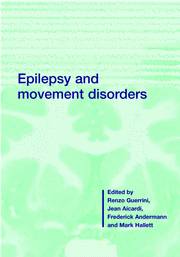Book contents
- Frontmatter
- Contents
- List of contributors
- Preface and overview
- 1 Epilepsies as channelopathies
- 2 Epilepsy and movement disorders in the GABAA receptor β3 subunit knockout mouse: model of Angelman syndrome
- 3 Genetic reflex epilepsy from chicken to man: relations between genetic reflex epilepsy and movement disorders
- 4 Functional MRI of the motor cortex
- 5 Neuromagnetic methods and transcranial magnetic stimulation for testing sensorimotor cortex excitability
- 6 Motor dysfunction resulting from epileptic activity involving the sensorimotor cortex
- 7 Nocturnal frontal lobe epilepsy
- 8 Motor cortex hyperexcitability in dystonia
- 9 The paroxysmal dyskinesias
- 10 Normal startle and startle-induced epileptic seizures
- 11 Hyperekplexia: genetics and culture-bound stimulus-induced disorders
- 12 Myoclonus and epilepsy
- 13 The spectrum of epilepsy and movement disorders in EPC
- 14 Seizures, myoclonus and cerebellar dysfunction in progressive myoclonus epilepsies
- 15 Opercular epilepsies with oromotor dysfunction
- 16 Facial seizures associated with brainstem and cerebellar lesions
- 17 Neonatal movement disorders: epileptic or non-epileptic
- 18 Epileptic and non-epileptic periodic motor phenomena in children with encephalopathy
- 19 Epileptic stereotypies in children
- 20 Non-epileptic paroxysmal eye movements
- 21 Shuddering and benign myoclonus of early infancy
- 22 Epilepsy and cerebral palsy
- 23 Sydenham chorea
- 24 Alternating hemiplegia of childhood
- 25 Motor attacks in Sturge–Weber syndrome
- 26 Syndromes with epilepsy and paroxysmal dyskinesia
- 27 Epilepsy genes: the search grows longer
- 28 Genetics of the overlap between epilepsy and movement disorders
- 29 Seizures and movement disorders precipitated by drugs
- 30 Steroid responsive motor disorders associated with epilepsy
- 31 Drugs for epilepsy and movement disorders
- Index
- Plate section
11 - Hyperekplexia: genetics and culture-bound stimulus-induced disorders
Published online by Cambridge University Press: 03 May 2010
- Frontmatter
- Contents
- List of contributors
- Preface and overview
- 1 Epilepsies as channelopathies
- 2 Epilepsy and movement disorders in the GABAA receptor β3 subunit knockout mouse: model of Angelman syndrome
- 3 Genetic reflex epilepsy from chicken to man: relations between genetic reflex epilepsy and movement disorders
- 4 Functional MRI of the motor cortex
- 5 Neuromagnetic methods and transcranial magnetic stimulation for testing sensorimotor cortex excitability
- 6 Motor dysfunction resulting from epileptic activity involving the sensorimotor cortex
- 7 Nocturnal frontal lobe epilepsy
- 8 Motor cortex hyperexcitability in dystonia
- 9 The paroxysmal dyskinesias
- 10 Normal startle and startle-induced epileptic seizures
- 11 Hyperekplexia: genetics and culture-bound stimulus-induced disorders
- 12 Myoclonus and epilepsy
- 13 The spectrum of epilepsy and movement disorders in EPC
- 14 Seizures, myoclonus and cerebellar dysfunction in progressive myoclonus epilepsies
- 15 Opercular epilepsies with oromotor dysfunction
- 16 Facial seizures associated with brainstem and cerebellar lesions
- 17 Neonatal movement disorders: epileptic or non-epileptic
- 18 Epileptic and non-epileptic periodic motor phenomena in children with encephalopathy
- 19 Epileptic stereotypies in children
- 20 Non-epileptic paroxysmal eye movements
- 21 Shuddering and benign myoclonus of early infancy
- 22 Epilepsy and cerebral palsy
- 23 Sydenham chorea
- 24 Alternating hemiplegia of childhood
- 25 Motor attacks in Sturge–Weber syndrome
- 26 Syndromes with epilepsy and paroxysmal dyskinesia
- 27 Epilepsy genes: the search grows longer
- 28 Genetics of the overlap between epilepsy and movement disorders
- 29 Seizures and movement disorders precipitated by drugs
- 30 Steroid responsive motor disorders associated with epilepsy
- 31 Drugs for epilepsy and movement disorders
- Index
- Plate section
Summary
Abnormal, excessive startle is a feature of three distinct conditions: hyperekplexia or startle disease, jumping (the jumping Frenchmen of Maine), and startle epilepsy. The mechanisms of normal / startle and startle epilepsy are reviewed by Brown et al. (this volume).
Clinical presentation
Kirstein and Silverskiold (1958), first described startle disease. Two sisters, their father, and the daughter of one of the sisters suffered from sudden violent falls precipitated by stress, fright, or surprise. Three of these family members also had nocturnal myoclonus. The authors cautiously considered the disorder to represent an unusual, genetically determined form of drop seizures. In a letter to Lancet, Kok and Bruyn (1962), drew attention to a hereditary disease affecting 29 individuals in six generations of a German–Dutch family with 127 members. Suhren et al. (1966), described this family in much greater detail. The affected individuals had a strikingly excessive response to startle elicited by visual, auditory, and proprioceptive stimuli that failed to produce a response in most normal individuals. These authors coined the term hyperekplexia, i.e. excessive jerking to describe the condition.
The disorder occurs in two forms: a minor form in which the response is quantitatively different from normal, i.e. the startle response is more violent; and a major form in which there are also additional clinical symptoms. In the major form, patients, when startled, experience momentary generalized muscular stiffness with loss of voluntary postural control causing them to fall as if frozen, with their arms at their sides, unable to carry out protective movements.
- Type
- Chapter
- Information
- Epilepsy and Movement Disorders , pp. 151 - 164Publisher: Cambridge University PressPrint publication year: 2001



